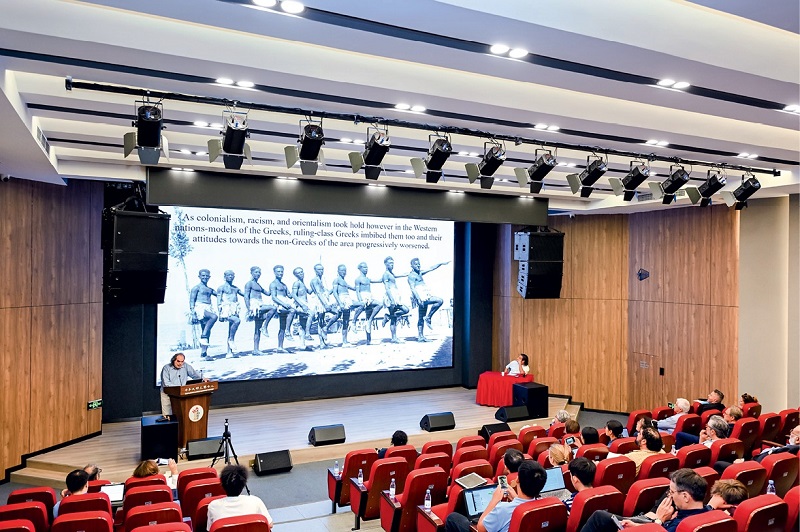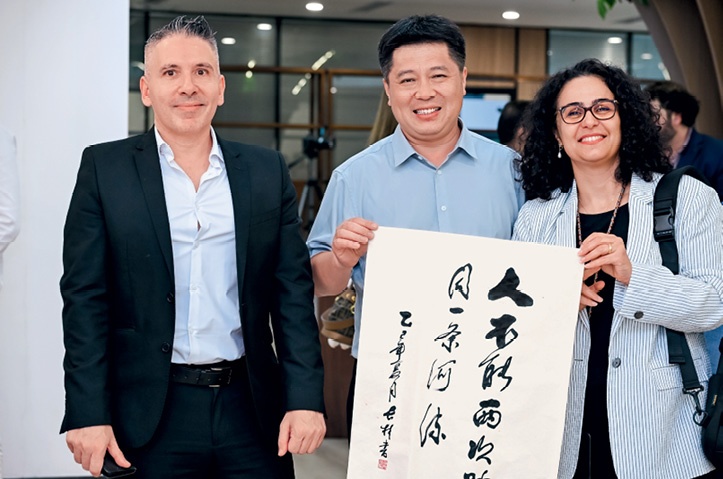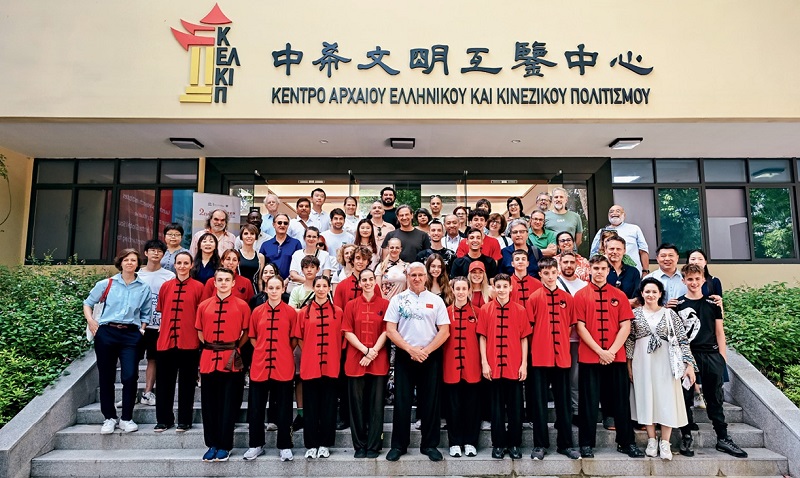The enduring wisdom of ancient Greece and China – often found in their classics – holds profound potential to address today’s pressing global challenges. This vital connection was powerfully underscored at the Second Global Forum on Mutual Learning among Civilizations, hosted at Southwest University in Chongqing in late June. Gathering over 60 scholars from more than 20 countries, the forum addressed critical questions: What is the contemporary value of these ancient texts? How can philosophies forged millennia ago offer actionable insights for our complex, interconnected, and often fractured world? The Greco-Roman world and China stand as the defining civilizational pillars of Europe and Asia respectively. Remarkably, both Chinese and Greek languages persist today in forms deeply resonant with their ancient origins, embodying an unparalleled feat of historical, ethnic, and cultural continuity. This linguistic bridge connects us directly to the minds of antiquity.

A presenter speaks at the Second Global Forum on Mutual Learning among Civilizations held in southwest China’s Chongqing. Around 60 academics attend the forum with three parallel sessions.
 Toward Modern Solutions
Toward Modern SolutionsThe study of classics transcends mere historical inquiry. Engaging with the millennia-spanning cultures of China and Greece/Rome provides a deep reservoir of ideas relevant to modern challenges. These ancient texts illuminate contemporary problems, allowing scholars from diverse backgrounds to re-examine antiquity through modern frameworks, extracting timeless wisdom for current needs.
Confucius and Plato still show their enduring relevance in the current world. Both lived in eras of profound upheavals and sought to establish unifying principles for societal harmony, political order, and cultural preservation. Their legacies resonate powerfully today. Confucius’s emphasis on ren (仁, benevolence), li (礼, propriety), yi (义, righteousness), and he (和, social harmony), as codified in the Five Classics and Four Books, offers frameworks for ethical governance and community cohesion. Singapore’s deliberate incorporation of Confucian values into its state’s vision known as “Our Shared Values” has been cited as a factor in its social stability and economic success.
Plato’s explorations of justice, truth, the ideal state, and the examined life (via Socratic dialogue) in works like The Republic and The Laws remain foundational to Western political theory and ethics. His concepts challenge us to critically assess power structures and the pursuit of the good.
The richness of classical studies lies in its interdisciplinary nature – encompassing literature, history, philosophy, and art. They cultivate critical understanding of statecraft, philosophy, history, and cultural diversity. Sun Tzus’ Art of War provides timeless insights into conflict resolution and strategic thinking, applied far beyond the battlefield. Thucydides’ History of the Peloponnesian War offers profound analyses of power dynamics, human nature in crisis, and the causes of conflict, relevant to modern international relations. Xenophon’s works blend practical leadership lessons with historical narrative. Socrates’ ethical imperatives, which center on the concept that virtue is equivalent to knowledge, particularly self-knowledge, the virtue ethics of Aristotle (Nicomachean Ethics, which explores the nature of human flourishing and the virtues that lead to it), and the cardinal virtues explored across Greco-Roman thought (like prudence, justice, fortitude, and temperance) find echoes in Confucian morality. Sima Qian’s monumental Records of the Grand Historian established standards for historical documentation and interpretation in China. Herodotus, the “Father of History,” celebrated cultural diversity in his Histories, while Pliny the Elder’s Natural History documented the known world, albeit with varying accuracy. Both demonstrate early attempts to understand the “other.”

Professor Wang Yong (center) of Southwest University poses with two Greek professors, Ioannis Kotoulas (left) and Zuhal Mert Uzuner (right).
Diverging Paths for Classical Studies
The current trajectories of classical studies in the West and China reveal stark contrast, highlighting both different approaches and the universal necessity of engaging with ancient cultures. Many Western countries have witnessed a significant decline in classical studies within academia. This stems from complex factors, including shifting educational priorities towards perceived “practical” skills, funding cuts to humanities, and influential intellectual currents that sometimes promote deconstructive analyses questioning the inherent value or objectivity of the Western canon. This has occasionally led to a marginalization of historical depth and cultural identity, replaced by abstract cosmopolitanism or strong forms of moral relativism. The European Union, for instance, often struggles to articulate a cultural identity rooted in its Greco-Roman heritage, favoring vague universalist ideals. Consequently, classics and humanities departments in Western universities face contraction, with fewer courses offered and sometimes a shift towards politicized interpretations over core philological and historical study.
Conversely, China is experiencing a vigorous revival of interest in its own classical traditions (国学, guoxue). Ancient Greek and Latin language courses are proliferating in Chinese universities. This surge is amplified by a sustained national emphasis on rediscovering and re-engaging with China’s own millennia-deep cultural and philosophical heritage. This positions China as a burgeoning center for classical studies and humanistic values. The widespread popularity of public lectures on Confucian and Daoist classics, government promotion of traditional culture in education, and significant academic investment in Silk Road studies connecting Eastern and Western antiquity exemplify this trend.

Attendees of the Second Global Forum on Mutual Learning among Civilizations pose for a group photo at the Center for Chinese and Greek Cultures, Southwest University in Chongqing.
The Compass for a Global Future
The Western trajectory risks mirroring a cautionary tale from Homer’s Odyssey. Encountering the Lotus-Eaters, Odysseus’s men consume the lotus fruit and succumb to apathy, forgetting their homeland and cultural identity, seduced by a timeless present devoid of history and responsibility. Odysseus must forcefully reclaim them to continue their journey home. This allegory powerfully warns against the peril of severing ties with our cultural origins. Forgetting the struggles, wisdom, and identity embedded in our classics leads to a dangerous amnesia and loss of direction.
The Greco-Roman and Chinese traditions are not relics but living foundations that decisively shaped and continue to inform the modern world. Studying them is far more than an academic exercise; it is an act of mutual respect and a crucial pathway to global harmony in our interconnected age.
The West’s retreat from its classics impoverishes its cultural self-understanding and severs the vital link between past and future. Reversing this trend requires concerted international academic cooperation. In this context, China’s ongoing classics revival serves as a potent model, demonstrating the principle of “learn from the past to serve the present” (古为今用, gu wei jin yong). It is essential to integrate the profound insights of ancient doctrines with contemporary realities, uncovering wisdom to navigate an uncertain future. By revitalizing the spirit of traditional civilizations, we nourish societal well-being, fortify cultural continuity and historical memory, strengthen individual character, and foster deeper cooperation and mutual respect between China, Europe, and all other cultures in the world. The classics remain our eternal compass, guiding us to honor our heritage, understand our present, and chart a course toward a more harmonious and resilient future. 
IOANNIS E. KOTOULAS is a lecturer in geopolitics at the University of Athens and co-chair of the Modern Greek Studies Program of Southwest University (Chongqing).